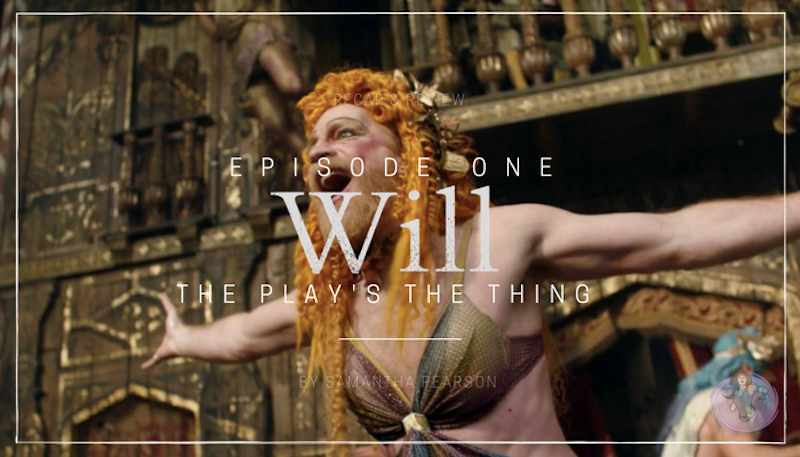
Will S01E01: The Play’s the Thing
Director: Shekhar Kapur
Writer: Craig Pearce
Starring: Laurie Davidson, Olivia DeJonge, Ewen Bremner, Mattias Inwood, Jamie Campbell Bower, William Houston, Lukas Rolfe, Colm Meaney
A review by Samantha Pearson
 When I learned that TNT is airing a “punk rock spin” on William Shakespeare, I had a little bit of a meltdown. As a self-proclaimed, devoted Shakespeare fanatic (think Mandella in 10 Things I Hate About You, only less delusional and with a portrait tattoo of the Bard on my arm), any and all alternative approaches to Shakespeare’s time in London are my favorite. Automatically.
When I learned that TNT is airing a “punk rock spin” on William Shakespeare, I had a little bit of a meltdown. As a self-proclaimed, devoted Shakespeare fanatic (think Mandella in 10 Things I Hate About You, only less delusional and with a portrait tattoo of the Bard on my arm), any and all alternative approaches to Shakespeare’s time in London are my favorite. Automatically.
Before you ask, yes, I unashamedly love Shakespeare In Love and Baz Luhrmann’s Romeo + Juliet. But we’re not here to talk about them.
We’re here to talk about Will. Prior to the two-hour series premiere on TNT, I streamed the pilot episode, The Play’s the Thing, on Amazon. Initially, I had every intention of looking at the inevitable historical inaccuracies and dissecting those as creative choices… but within ten minutes, I was so impressed that I no longer cared.
The Play’s the Thing dives right into the life of young William Shakespeare, who’s leaving Stratford for London with a copy of Richard III in hand. Historical accounts suggest that Shakespeare arrived in London sometime in or before 1590, as several of his plays were first performed between 1590 and 1592.
Will performs a brief bit of exhibition in Stratford, with Anne Hathaway (Shakespeare’s wife, not the actress) asking, “Who would want a play by William Shakespeare?” It’s a meta introduction to a show that embraces meta at every opportunity, littering the series with references to Shakespeare’s later plays as well as cinematic adaptations of them. Will leaves his son Hamnet with Queen Mab to tell him bedtime stories, then departs his family home with warnings that it is “better to die righteous than to burn for fear.”
Upon arriving in London, he is immediately accosted by the unfamiliar sights, sounds, and smells of a punk-dusted London marketplace. The Clash’s “London Calling” transitions Will from the country to the city and seamlessly introduces the audience to what Will wants to do. The series truly does put a “punk rock spin” on Shakespeare’s early life. Its anachronisms serve to underscore the universal and often anti-establishment themes presented in Shakespeare’s works.

In conjunction with Will’s story, we are also introduced to Presto, a street rat whose sister works by necessity in a brothel. Presto offers to show Will around, then steals from him, cuts his hand, and aims to have him arrested for practicing Catholicism for a cash reward. Within the first ten minutes of The Play’s the Thing, two Catholics are literally torn apart for their religion. One has his intestines removed in front of a crowd and the other has his tongue removed by the man to whom Presto tries to sell Will’s life.
The Jam’s “That’s Entertainment” plays over a transition from tongue removal to the playhouse, where a riotous audience has been promised a play by Christopher Marlowe. Kit, however, is on contract with Henslowe of the Rose, and therefore cannot produce work for any other playhouse… despite already having been paid to do so.
In the absence of a play, the players take to simply dancing on stage. Radio Birdman’s “New Race” plays over performers stage diving and fighting with the audience and reveals that the world of Will is one of tattooed, rainbow-hair-colored, pierced persons who would fit better in 1970s London than 1590s London.
It’s beautiful.
To tame the crowd, a new play by Kit Marlowe is promised, entitled Tamburlaine the Ghost. However, Kit has no intentions of writing such a play, and the players know it. So instead, they take young Will up on his offer: “Mine is about the heroic King Edward and his son, the Black Prince. There’s love, war, death, and betrayal.” When he’s asked, “Is there any comedy?” He replies, “Um… the Scottish characters are quite funny.”
This comment is one of those meta references I talked about earlier. In many of Shakespeare’s histories, among them Richard III, non-English characters are used for comic relief. Their comedy is used to reflect the flawed thinking of the English characters, but in such a way that it can be ignored or laughed off by English audiences. Since Shakespeare was writing to please a forward-thinking queen who encouraged drama at a time when playhouses were looked down upon, these distinctions were of paramount importance.
Will goes on to nitpick at another aspect of Shakespeare’s career: his tendency to make up words. William Shakespeare is credited with creating over 1,700 words used in the English language today, something many scholars believe to be false. They argue that there’s no way an uneducated whelp from Stratford could have written as many plays as Shakespeare. They also claim there’s no way he could have produced such high quality work or invented so many useful words because of his lack of education.
In The Play’s the Thing, one of the players comments directly on this controversy. He tells Will to leave wordmongering to the educated peoples and to remove his fake words from his play. In the same scene, the playhouse director’s daughter, Alice Burbage, defines herself thusly: “I am that most useless of creatures, an educated woman. It seems women are only good for ruling the nation, rearing children, and whoring.”

Historically, Alice Burbage’s brother Richard was one of the first actors to ever perform in Shakespeare’s plays. He, his brother Cuthbert, Alice, Shakespeare, and thespian William Kempe opened the famous Globe theatre in 1599. In Will, her education makes her see Will as a brilliant playwright and she introduces him to the London theatre community, thereby launching his career.
From there, The Play’s the Thing explores Shakespeare’s writing (England refusing to accept Richard as their king offending nature, for example) and shines a light on his infamous wit. He faces off against a comedian in a tavern in the equivalent of a very white rap battle, wins summarily, and ends his impromptu performance with a nod to one of Shakespeare’s later works, A Midsummer Night’s Dream. In language invoking the final speech by the trickster Puck, Will says, “If this upstart has offended, think on this — I pray, all’s mended. Whether fine-feathered or the most common of bird, to wing our way to Heaven, all we need are words.”

Other lines are borrowed (and twisted) from Romeo and Juliet, and particular emphasis is placed on the idea that an actor holds a mirror up to nature. Will jumps on stage to save the ending of Richard III when Richard Burbage nearly slaughters it and Christopher Marlowe even allows him to take credit for writing the play, despite it being billed as Marlowe’s own work.
Of course, Kit introduces Will as “Master Will Shakeshaft”, but that’s better than “Willy Wankspeare”, so that’s not so bad…
Although Kit and Will do not meet until the end of the episode, there is a significant amount of tension between them that makes itself known immediately. Kit’s actions at the end of the episode are very interesting given how things played out historically, and I frankly cannot wait to see what happens next. My one and only hope is that Will doesn’t queerbait. The possibility is there already, but Shakespeare was indiscriminate in his affairs, and it would be incredible to see that explored on this series.
I’m already obsessed with Craig Pearce’s writing and Shekhar Kapur’s directing. The musical direction is flawless and the editing team is doing some really fabulous work. I also love the acting. Laurie Davidson appears to have a very firm grasp of Will as a character and I wasn’t nearly as turned off by Jamie Campbell Bower as Kit as I expected to be. Olivia DeJonge’s Alice is also delightful.
The Verdict
Oh, absolutely watch Will on TNT. The two-hour premiere airs tonight at 9PM EST and you will not regret a single minute of it.




3 thoughts on “Will S01E01: The Play’s the Thing Recap & Review”